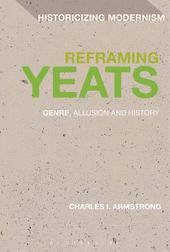
|
Reframing Yeats: Genre, Allusion and History
Hardback
Main Details
Description
Reframing Yeats, the first critical study of its kind, uses a focus on genre and allusion to engage with a broad range of W. B. Yeats's writings, examining instances of his poetry, autobiographical writings, criticism, and drama. Identifying a schism in recent Yeatsian criticism between biographical and formalist methodologies, Armstrong's study combines an historicist perspective with close attention to literary form. The result is a flexible approach that casts new light on how Yeats's texts interact with their interpretative frameworks. Cognizant of both literary and political history, this book presents new interpretations of Yeats's work. Not only does it provide fresh readings of texts such as "The Municipal Gallery Re-visited," "Among School Children" and "The Resurrection", but it also raises important new questions concerning Yeats's relationship to Modernism and literary genre.
Author Biography
Charles Ivan Armstrong is Professor of British Literature, University of Agder, Norway.
Reviews[Reframing Yeats is] an intellectually nuanced, theoretically contextualized study of Yeats's multifaceted engagements with literary genres and previous authors ... both illuminating and highly accomplished. -- Nels Pearson, Fairfield University * Review of English Studies * [Reframing Yeats] avoids the monolithic works that tend to prop up other critical books on Yeats ... Armstrong is good on the topic of vox populi, Yeats's complex engagement with his reading and spectating public, arguing that 'Despite being fascinated by the fixity and quasi-autonomous power of the written word, Yeats had little time for those who saw poetry as something created autonomously out of the subjectivity of the poet'. * The Year's Work in English Studies *
|